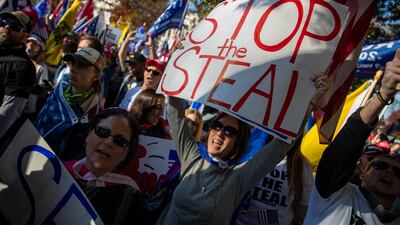From the Oklahoma bombing in 1995, the Pittsburgh synagogue massacre in 2018 and the attack on the US Capitol in 2021, home-grown extremism has become an increasing threat in the US.
Groups including QAnon, which promotes conspiracy theories, the Proud Boys, a men-only neo-fascist organisation, and Oath Keepers, an anti-government militia, became more visible following the Capitol riot, which has been denounced by the White House and the Justice Department as an act of domestic terrorism.
“On January 6, 2021, Americans witnessed an unprecedented attack against a core institution of our democracy: the US Congress,” the White House wrote in its strategy on domestic terrorism, released last June.
The document, the first in US history focused on domestic terrorism, addresses the transnational dimensions of white supremacist and other domestic terrorist violence and expands the scope of the federal government and law enforcement authorities in countering this threat.
But a year on from the January 6 attack, experts who follow US domestic extremism that current efforts are not enough, and that the more localised and entrenched these groups become, the more difficult they become to defeat.
Lorenzo Vidino, director of extremism programme at George Washington University, sees the current federal response to domestic extremism as lacking.
“The US government for the most part and for a long time has underestimated and overlooked the problem of domestic extremism,” Mr Vidino told The National.
He pointed to the heightened focus on extremist groups such as Al Qaeda after the September 11, 2001 attacks and ISIS later on, the entrenchment of some far-right groups in law enforcement and the military, and legal barriers as the main reasons behind the lag.
“We are seeing a number of people within law enforcement or the military who belong to some of these groups like the Oath Keepers that have sheriffs and deputies in their rank,” the expert said.
In the year since January 6, federal authorities have charged more than 700 people in connection to the riot at the Capitol. Prosecutors say the sprawling investigation is now the biggest probe in US history, both in terms of the number of defendants and the sheer quantity of evidence.
The extremism programme reported that 12 per cent of those facing charges have a military background.
Mr Vidino sees certain commonalities between domestic and foreign extremists, one of them being that the majority of the people involved in such groups tend to be men (87 per cent in the case of January 6), averaging between 30 and 40 years of age.
But unlike countering foreign extremism, the US government has a limited set of tools for going after domestic extremists.
Though Congress tends to be all in when it comes to pursuing foreign extremists, when it comes to laws allowing domestic surveillance or cracking down on communications between far-right group members, Mr Vidino says there is ample political resistance.
“The strategy is very much in its infancy … In the last two decades, bills to introduce domestic terrorism laws similar to those applied to foreign groups to domestic never made it [in Congress]," he said.
Even the White House document addressing domestic terrorism came under attack from both the right and left for threatening individual freedoms.
“It relies too heavily on law enforcement suspicion, investigation and policing of beliefs rather than actual conduct — violence or attempted violence,” the American Civil Liberties Union said in its criticism of the document.
Beyond the federal response, other experts are concerned that far-right extremism has become more resilient since January 6.
Colin Clarke, a senior research fellow at The Soufan Centre where he studies extremism, said the movement is now more locally focused and has adjusted to the post-Donald Trump era.
“We have seen a clear re-orientation of the far-right extremist threat in the US. Now that Trump is gone, there has been something of a shift to more of a grassroots movement, which is manifesting itself in threats to local school boards and more politicians running for local office that are resorting to extremist rhetoric,” Mr Clarke said.
Mr Trump frequently fanned the flames of far-right extremist conspiracies or looked the other way as racist and anti-Semitic attacks took place in Charlottesville and Pittsburgh.
Mr Clarke describes a more durable and evolved far-right extremist ecosystem, focused on community activism.
“It is now a much broader tent and includes not just anti-government and anti-authority extremists, but also conspiracy theorists and [anti-vaccination activists],” he said.
Steven Bannon, Mr Trump’s former aide who has been charged with contempt by the Department of Justice over the January 6 investigation, encouraged the far-right movement to pivot to local elections.
“We're going to take this back village by village … precinct by precinct,” Mr Bannon told his supporters in February, an investigation by ProPublica showed.
The movement has utilised the pandemic to promote anti-vaccine rallies and reject school safety restrictions.
“The pandemic has been an ideological godsend for the far right,” Mr Clarke said.
While Canada designated the Proud Boys a terrorist entity after the Capitol siege, it remains unlikely the US will follow suit, both Mr Clarke and Mr Vidino said.
Still, Mr Clarke sees a break in the national momentum for these groups.
“The Three Percenters and the Oath Keepers have likely been deterred by the arrests, charges in the insurrection and lawsuits, leading to financial concerns and threatening their viability,” he Clarke said.
















